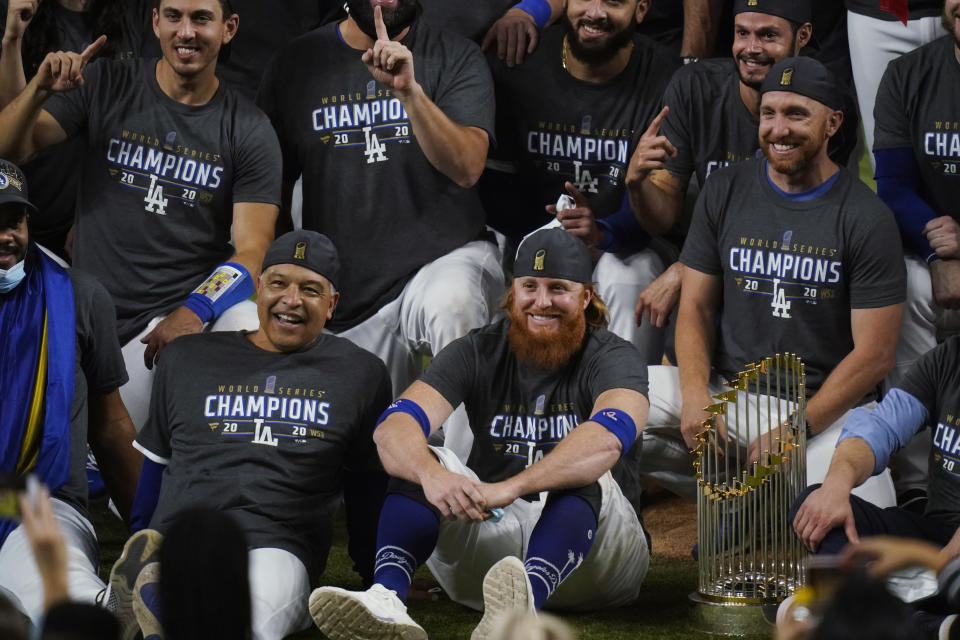Can a COVID-19 spreader face legal trouble?
At the conclusion of the World Series Tuesday night, Dodgers third baseman Justin Turner joined the team’s celebration despite the fact that he’d tested positive for COVID-19. Turner defied team and league mandates to remain isolated, and joined the Dodgers on the field, holding the trophy and posing for pictures without a mask.
While Turner had been around his teammates for several innings prior to being pulled during the game, and several hours, if not days, prior to Game 6, it’s still theoretically possible he could have spread the virus to someone on the field that night.
This, then, raises the question of liability. If someone infected with COVID-19 knowingly interacts with other people, would those people have cause to file suit against that individual?
Throughout the pandemic, attorneys have argued it’s unlikely. “Causation is very difficult to prove in disease transmission cases,” Gregory Keating of USC’s Gould School of Law said. Sexually transmitted diseases are an exception, but so far, Keating added, “COVID-19 has conformed to the normal case.”
Absent continuous and comprehensive contact tracing in a bubbled environment, it would be exceedingly difficult to prove that one specific infected individual was responsible for infecting others. While certain mass gatherings over the last several months have been designated as “superspreader” events, the specific individuals responsible for spreading infection often have not been identified.
The more plausible angle of prosecution in a case where an individual disregards typical safety protocols could be battery.
“The tort of battery covers ‘offensive’ as well as ‘harmful’ contacts,” Keating said. “Touching someone else when you know you have a highly transmissible, dangerous disease and might infect them is contact that a jury could very well find to be ‘offensive.’”
There’s another aspect to consider: whether an individual intentionally spreads COVID-19. It’s conceivable that an infected individual could attempt to maliciously infect others. In that case, the spreader could theoretically be prosecuted under anti-terrorism laws, according to a March 2020 memo from the Department of Justice.
“Because Coronavirus appears to meet the statutory definition of a ‘biological agent’… such acts potentially could implicate the Nation’s terrorism-related statutes,” Deputy Attorney General Jeffrey Rosen wrote in the memo, obtained by Politico. “Threats or attempts to use COVID-19 as a weapon against Americans will not be tolerated.”
Intent is the key here, and someone like Turner — whose primary intention was celebration, not infection — is likely not going to face prosecution from the Department of Justice.

All this is not to say that COVID infections aren’t generating a flurry of legal activity. A COVID-19 complaint tracker developed by the law firm of Hunton Andrews Kurth indicates that as of Oct. 29, 5,852 complaints had been filed in connection with COVID-19. The most common categories of complaint are insurance-related or regarding civil rights, such as protests against mask mandates.
However, personal injury lawsuits arising from COVID infection would be exceedingly difficult to win based on the simple fact that in the middle of a pandemic, infection can come from any direction.
“In the context of a potential lawsuit based on coronavirus infection, establishing personal injury liability would require showing that one identifiable person [the defendant] actually passed the infection onto another identifiable person [the plaintiff] — mere fear of being infected isn't enough,” writes David Goguen, editor of Nolo, a consumer-focused legal website. “Posing a threat to the public in general can't form the basis of a personal injury lawsuit, and it's next to impossible to prove that one person actually caused another person's illness in the midst of this pandemic.”
More from Yahoo Sports:
